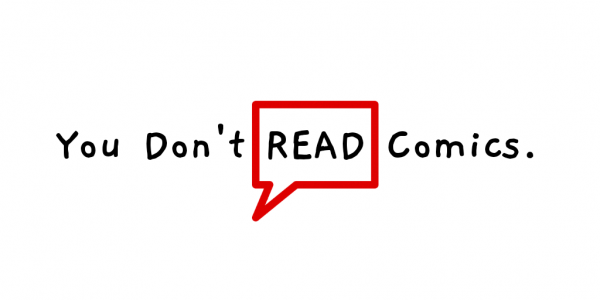Harley Quinn #51 // Review
The Golden Age meets the modern world as a semi-reformed psycho clown girl is forced to deal with the fallout of having recently come very close to completely destroying all of the continuity in the DC Universe. What else could it be but Harley Quinn #51? Sam Humphries scripts a pleasantly novel variation on the classic displaced hero cliche in a story drawn by Sami Basri with colors by Alex Sinclair.
As a result of the near-destruction of continuity of the DC Universe, a character from the Golden Age has found himself stranded in the contemporary world. The hero in question is the Flash Gordon-like World War II hero, Captain Triumph, who made his first appearance in Crack Comics #27 all the way back in 1943. After a healthy career in the Golden Age, the character disappeared, only to occasionally return for sporadic appearances since. The largely forgotten character drops in on Harley just as she’s having a really annoying lunch with her mother on the Upper West Side. Harley is lamenting how difficult it is NOT to be a criminal, when Captain Triumph shows-up. The ever-so-slightly reformed Harley is contrasted against the well-meaning danger and destruction brought about by a misplaced hero from another era.
Playing the slightly reformed playful anti-hero against a hero of an earlier age has its charm, but the overall premise has been pretty extensively explored elsewhere. Golden Age heroes have been tossed into the present so much that the concept itself almost seems retro. The unique chemistry of Harley and Triumph is great fun, though. There’s a real emotional appeal of both characters. Neither of them fit into the world, so they make for a fascinating pair. The other clever novelty here is keeping Harley in touch with “Continuity Cop” Jonni DC. The distinct mix of genuine emotional dynamics, with a casual disregard for the fourth wall (and the absurdly silly concept of universal continuity in a superhero universe), keeps the overall story interesting.
There is a dynamic cohesion with Sami Basri’s art. It comes together quite well. There is a sense of time and place that is very clearly present. There isn’t a whole lot with the character that feels distinctly Golden Age. Sinclair’s coloring is beautiful, but pretty uniform overall. A story that contrasts two eras should have more of a distinction between the present and the past. This is something that the colors could have rendered beautifully. Something along the lines of a faded, old newsprint hero in a modern world of contemporary color might have been fun. Captain Victory’s overall look is there from the Golden Age, but it’s so difficult to define a character from that era against the backdrop of the present without making him like a little bit to updated. That being said, Basri makes the emotions feel very real, without compromising the overall sense of humor that keeps it all moving.
Humphries continues to take the character in an interesting direction. She’s considering crime again because it‘s easier for her, at a time when the walls of reality are coming apart around her. As she’s been put on notice for nearly destroying the DC universe, it’s a miracle her series is still even considered canon (it’s a matter Jonni DC is still quite upset about.) Routinely breaking the fourth wall the way Harley is here is nothing new. It’s something that’s been most recently popularized by Deadpool, but it had been done with great style by (among others) Gerber’s Howard the Duck in the 1970s, Giffen’s Ambush Bug in the 1980s, and Byrne’s Sensational She-Hulk in the 1990s. The stroke of genius here is that Harley’s breaking the wall because she doesn’t care how much of any of this is all in her head, and how much does it really matter? Harley’s on the edge of sanity, sensibility, reality and the law. Harley’s title is casually cartwheeling off in an interesting direction that could break new existential spoofery beyond the accomplished works of Gerber, Giffen and Byrne.










